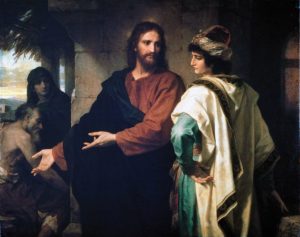Thoughts on Sunday’s Lessons for Oct. 14, 2018

Reflect on this: This painting of Christ and the Rich Young Ruler (1889) by Heinrich Hofmann (1824-1911), was purchased for Riverside Church in New York by John D Rockefeller Jr., one of the richest men in the world. (Click image to enlarge.)
First Reading (Track One): Job 23:1-9, 16-17
You should really turn back and read the portion of Job that came just before this reading. Job has lost everything, including all his possessions and much of his family. Now his friends, seeking to console him, have done a spectacularly poor job of showing compassion. He must have done something wrong, they assured him, asking if his lack of piety or his great wickedness might have angered God. Now Job responds with bitter, angry words. He deserves a chance to lay out the facts, to argue his case before God, he says; and if he could get a hearing, he would surely prevail. But he looks in every direction yet can’t find God anywhere. He is terrified and wants to vanish into darkness. Hold these thoughts: We’ll hear God’s response to Job next week.
First Reading (Track Two): Amos 5:6-7, 10-15
The strong theme of Sunday’s readings reminds us how important it is to subject ourselves to God, behaving justly and giving to the poor, never stealing from or harming those less favored. Indeed, we hear in the Gospel that no matter how well we follow the commandments, we must furthermore give everything that we have to the poor. The Prophet Amos, warning Israel’s Northern Kingdom that its habit of living well while trampling the poor will lead to disaster at the hands of the Assyrians. “Seek good and not evil,” urges the prophet. A few verses after this reading, Amos will call on the people of God to “let justice roll down like waters, and righteousness like an ever-flowing stream.”
Psalm (Track One): Psalm 22:1-15
When Jesus was dying on the cross, in his last agony he cried out the words that begin Psalm 22: “My God, my God, why have you forsaken me?” This Psalm, titled “Plea for Deliverance from Suffering and Hostility” in the New Revised Standard Version, also echoes Job’s lament. It is the cry of one who has suffered as Job has suffered, mocked by those around him and sunk in the depth of despair. He thinks that he has no place to turn; but there is still God, who knew him as an infant and who, he prays, will remember him now.
Psalm (Track Two): Psalm 90:12-17
We jump in to the middle of this Psalm in Sunday’s readings, skipping past the first portion in which the writer – held by unlikely tradition to be Moses himself – has warned of God’s anger with a sinful people. In these verses we plead with God to return, to show loving-kindness, to teach the people to be wise, and to replace our adversity with gladness. Through God’s works, grace and splendor, we pray, may the people be wise, turn the work of our hands to God’s purposes, and enjoy prosperity as the result of our handiwork.
Second Reading: Hebrews 4:12-16
The letter to the Hebrews may reveal its roots in persecution in the early church: It speaks of Jesus, the word of God, in terms that we seldom associate with the Good Shepherd: “sharper than any two-edged sword, piercing until it divides soul from spirit, joints from marrow … before him no creature is hidden, but all are naked and laid bare …” God expects much of us. But we also know that Jesus knows and understands us; although Jesus is our great high priest who has passed through the heavens, he also can sympathize with our weakness, having been tested in every way as we are tested. We may approach the throne of grace boldly, seeking mercy and receiving grace.
Gospel: Mark 10:17-31
Jesus’ words in this Gospel might seem harsh: If the rich man can’t give all his money to the poor, he isn’t welcome in God’s kingdom. But why? This man is good. He keeps the commandments. Mark even tells us that Jesus loved him. Perhaps Jesus is still reflecting on the verses that came just before, contrasting this wealthy man with the innocent children who will inherit God’s kingdom. Or Jesus may be exaggerating for effect, as he may have done with his response to the Pharisees about divorce in last week’s Gospel. But even if we think we can get away with not taking these verses literally, we can hardly ignore Jesus’ compelling call to serve others, to care for the least of these, and to place ourselves last in order to be first in God’s Kingdom.
What are “Track 1” and “Track 2”?
During the long green season after Pentecost, there are two tracks (or strands) each week for Old Testament readings. Within each track, there is a Psalm chosen to accompany the particular lesson.
The Revised Common Lectionary allows us to make use of either of these tracks, but once a track has been selected, it should be followed through to the end of the Pentecost season, rather than jumping back and forth between the two strands.
For more information from LectionaryPage.net, click here.
